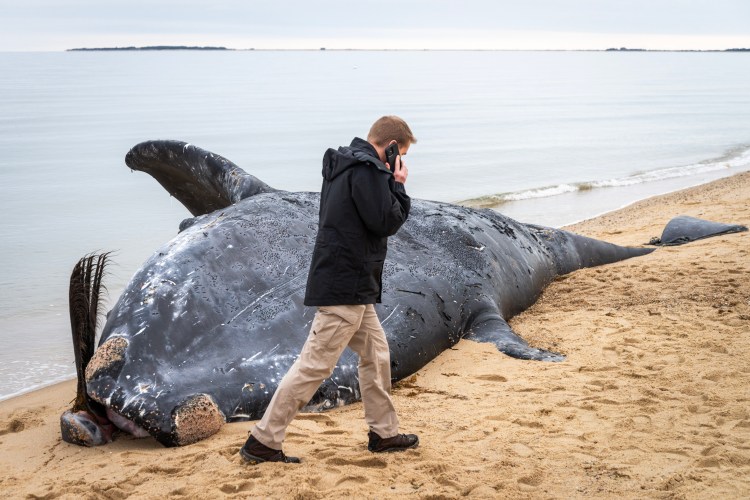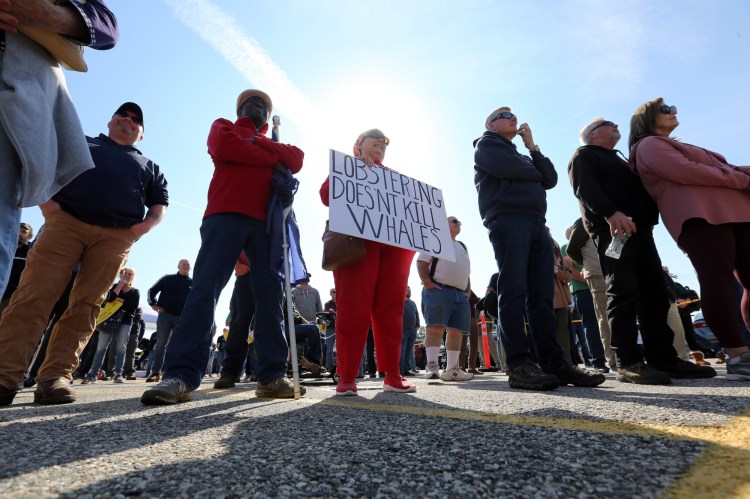
A congressional committee is considering a 10-year delay of new regulations aimed at protecting the North Atlantic right whale by changing fishing practices for lobstermen.
Rep. Jared Golden, D-2nd District, spoke before the Subcommittee on Water, Wildlife and Fisheries on Tuesday, urging it to support the amendment.
“If the moratorium expires in 2028 (as planned), lobstermen will have insufficient time to plan for new regulations and may well find themselves unable to comply and forced to stop fishing entirely,” Golden said in his testimony. “I believe that changes need to be made to the law to ensure that it cannot be used to shut down entire fisheries and the communities they support.”
Researchers say that preventing fishing gear entanglements is one of the most important ways to protect the right whale, which was deemed an endangered species by the National Oceanic and Atmospheric Administration.
But Maine lobstermen are afraid the regulations aimed at preventing those entanglements will ultimately bar them from using traditional trap-and-buoy gear. And they believe those limitations would gut the state’s historic lobster industry as they know it. The writing of any rules has already been delayed once, until Dec. 31, 2028.
Golden has long supported the Maine lobstering industry in its quest to prevent strict, sweeping regulations from going into effect.
Environmental advocates worry that the current delay already poses a serious risk. And that extending it until the end of 2035 could seal the right whale’s fate.
“This bill would … (be) all but guaranteeing that the iconic right whale — a part of America’s history from our nation’s earliest days — will be wiped from the face of the Earth,” a group of 70 conservation organizations wrote in a letter to the committee.

DRAWING OUT THE DELAY
Research from NOAA Fisheries indicates that fishing-gear entanglement is the primary cause of serious injury and death among whales. It shows that fishing entanglements have killed 10 right whales, and severely injured another 91 whales, since 2017. As of October 2024, the most recent data available, NOAA estimates there are just 370 right whales left.
NOAA has since mandated new gear-marking rules, a reduction in the number of vertical lines in the water, the insertion of weak points in the lines, and a seasonal closure of a nearly 1,000-square-mile area in the Gulf of Maine.
Maine fishermen have contended that their gear has not contributed to these cases, nor do they ever see whales out on the water. That is, until last year, when Maine fishing gear was found on the carcass of a dead right whale. Federal officials concluded that the whale had died from “chronic entanglement” in the Maine gear. It was the first time officials conclusively linked Maine’s lobstering industry to the death of a right whale with identifiable gear.
In 2023, a federal judge sided with Maine lobstermen, finding the federal government based the regulations “upon worst-case scenarios or pessimistic assumptions” from NOAA’s research.
Maine’s congressional delegation successfully advocated for a rider in the 2023 federal spending bill that granted a six-year reprieve from new, stricter regulations.
But Golden and Maine’s lobstering industry believe that NOAA and lobstermen need more time.
NOAA’s Atlantic Large Whale Take Reduction Team — a group of fishermen, scientists, conservationists, and state and federal officials — will begin holding meetings to discuss possible new regulations in 2026, but they won’t be able to start writing them until Jan. 1, 2029. Golden believes that’s still not enough time for lobstermen to prepare.
“(This amendment) would give the government the time it needs to craft regulations based on real science, reliable data and input from Mainers,” Golden told the committee. “And it would give lobstermen the time they need to prepare for whatever additional costs and changes to their harvesting practices may be required by new regulations.”

We invite you to add your comments. We encourage a thoughtful exchange of ideas and information on this website. By joining the conversation, you are agreeing to our commenting policy and terms of use. More information is found on our FAQs. You can modify your screen name here.
Comments are managed by our staff during regular business hours Monday through Friday as well as limited hours on Saturday and Sunday. Comments held for moderation outside of those hours may take longer to approve.
Join the Conversation
Please sign into your CentralMaine.com account to participate in conversations below. If you do not have an account, you can register or subscribe. Questions? Please see our FAQs.